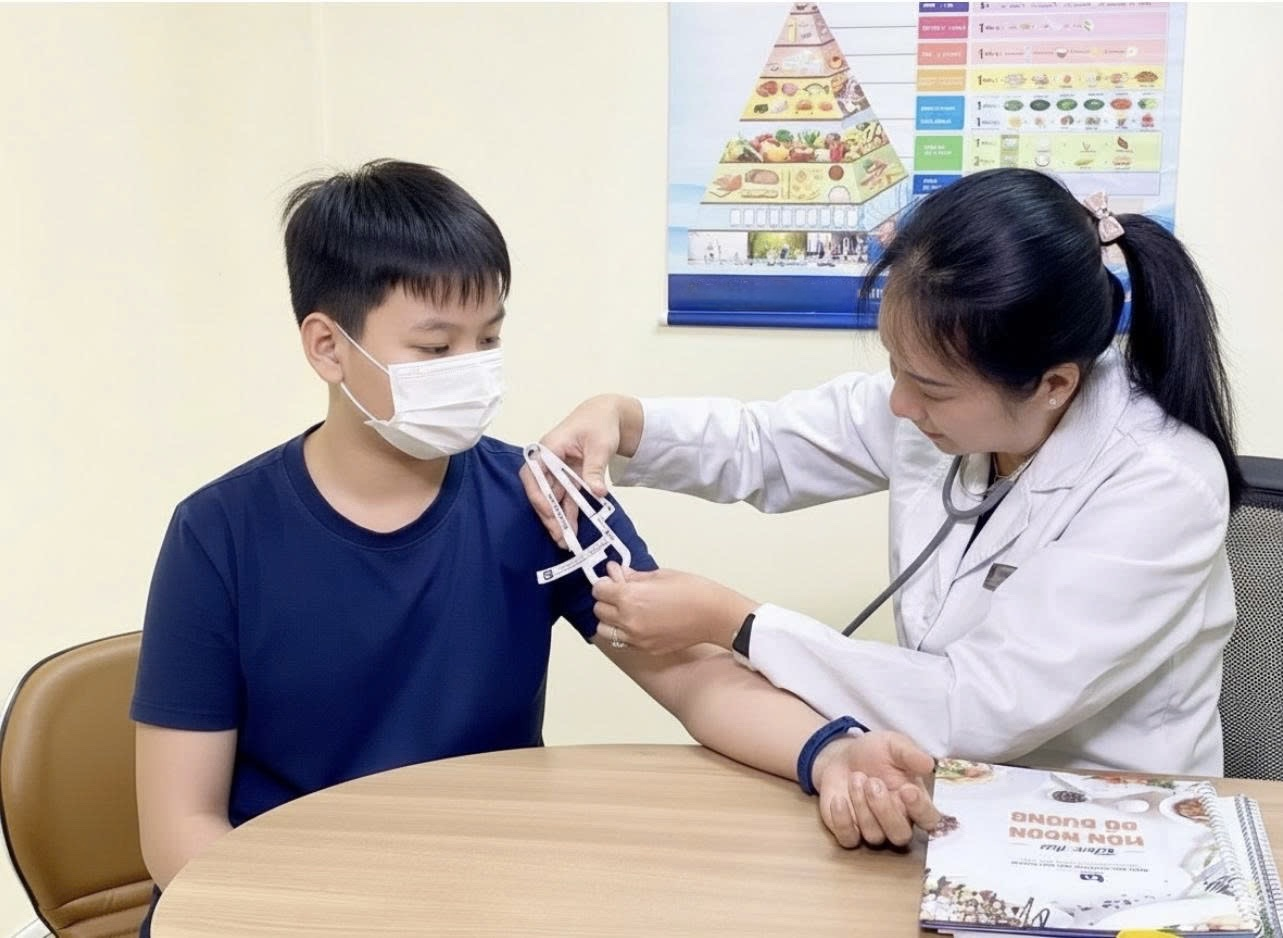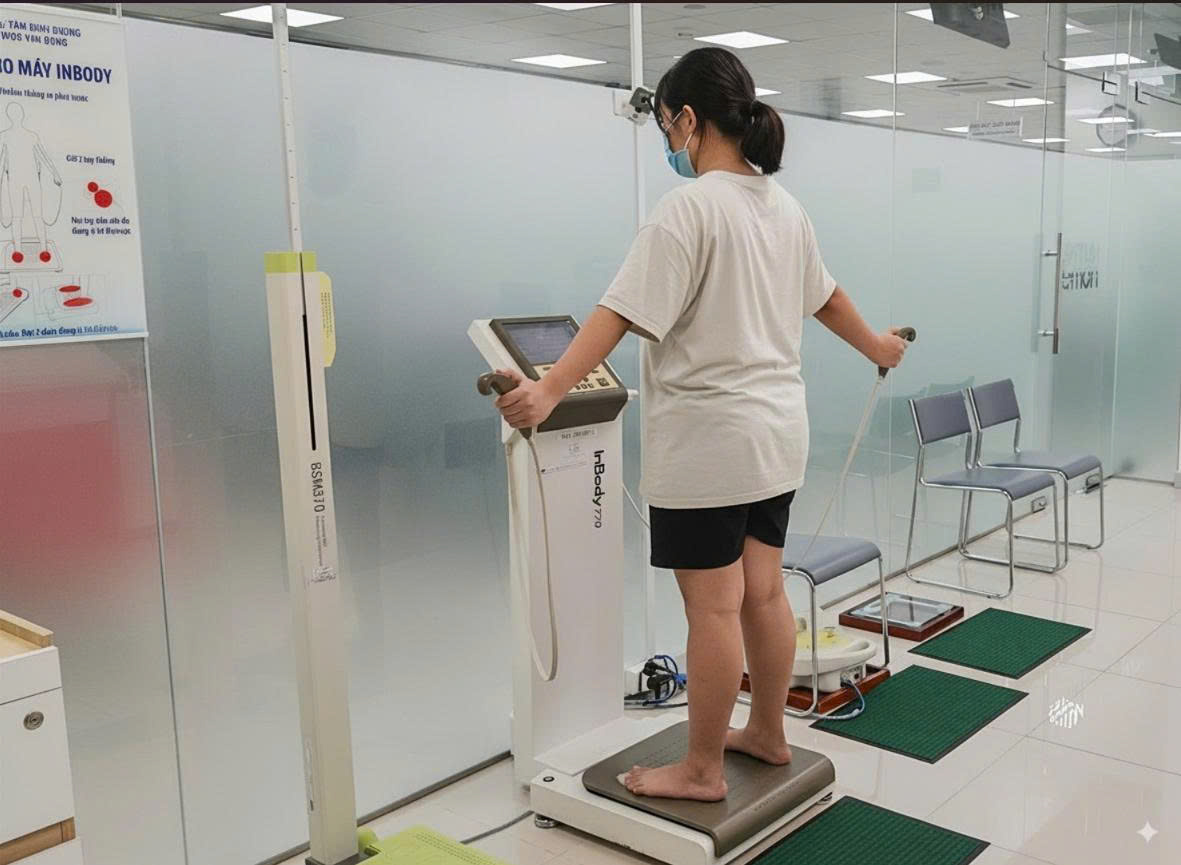Doctor Dao Thi Yen Thuy, Head of the Nutrition and Dietetics Department at Tam Anh General Hospital in Ho Chi Minh City, stated that resistance training like weightlifting at the gym does not affect bone development if done correctly and safely under the guidance of a trainer. Gym workouts help children increase muscle mass, improve bone density, and stimulate growth hormone. However, if children only focus on exercise without paying attention to their diet, they can easily become nutrient deficient, affecting their health and height development.
"Nutrition accounts for nearly one-third of a child's height growth potential, alongside genetic factors, exercise, sleep, living environment, and illnesses," said Doctor Yen Thuy. Teenagers who work out at the gym need to maintain a diverse diet with a variety of food sources.
Protein is a crucial component for building muscles, tissues, and hormones. Teenagers who exercise regularly need about 1.2-1.5 grams of protein per kilogram of body weight per day. Protein sources should be diverse, ranging from milk, eggs, fish, and lean meat to beans and nuts.
Protein, calcium, vitamin D3, and vitamin K2 play fundamental roles in building strong bones. Children aged 10-18 need about 1,000-1,300 mg of calcium per day. Vitamin D3 helps the body absorb calcium effectively and can be obtained through sunlight or foods like salmon, eggs, and fortified milk. Vitamin K2 helps transport calcium into bones, preventing it from depositing in blood vessels.
 |
Doctor Yen Thuy measures the thickness of subcutaneous fat, assesses nutritional status, and advises on a child's diet. Photo: _Tam Anh General Hospital_ |
Zinc and magnesium are two important micronutrients that promote cell division and growth plate development. Zinc deficiency can lead to stunted growth and delayed puberty. Foods rich in zinc and magnesium include seafood, red meat, pumpkin seeds, whole grains, and dark green vegetables.
To have enough energy for exercise, children also need complex carbohydrates from brown rice, potatoes, and oats, along with healthy fats from fatty fish, avocados, and olive oil to aid in the absorption of fat-soluble vitamins.
Doctor Yen Thuy explained that a proper diet also needs to be combined with appropriate meal timing. Children's breakfast should be rich in protein and healthy carbohydrates to provide energy for studying and physical activity. 1-2 hours before exercising, children can have a light snack consisting of carbohydrates and a small amount of protein, such as whole-wheat bread with eggs. Within 30-60 minutes after exercising, children should replenish protein and carbohydrates for muscle recovery.
Children should avoid or limit certain foods that hinder nutrient absorption. Carbonated soft drinks contain high levels of phosphates, which reduce calcium absorption, while caffeinated beverages like strong tea and coffee affect the absorption of iron and calcium. Fast food, high in fat and refined sugar, increases the risk of obesity, indirectly impacting muscle mass.
 |
Children have their body composition measured by the InBody 770 machine, which helps create a suitable diet for height growth. Photo: _Tam Anh General Hospital_ |
In addition to nutrition, children need to follow a gradual exercise routine. Doctor Dao Duy An Duy from the Orthopedic and Trauma Center, said that 10-11 year olds should start with exercises like push-ups, planks, and bodyweight squats (using their own body weight, without adding weights) to develop motor skills and endurance. Children aged 12-14 can incorporate light resistance equipment, focusing on technique and flexibility, avoiding an emphasis on performance. Only after the age of 15 should children start weight training with loads, but they must follow a personalized program and exercise under the supervision of a trainer.
Children with cardiovascular disease, chronic respiratory problems, growth disorders, rickets, malnutrition, or those recovering from injuries should limit strenuous exercises. Children who are fearful or not ready to cooperate should not be forced to do high-intensity exercises. Adapting exercises to a child's physical condition, mental state, and developmental level ensures safe and effective exercise, according to Doctor An Duy.
Children who work out at the gym need to get enough sleep, 8-10 hours per day. Sleeping before 10 PM is crucial because growth hormone is secreted most abundantly at night during deep sleep. To effectively increase height, parents should take their children to see nutrition and musculoskeletal specialists. Doctors can recommend a diet and exercise plan suitable for the child's physical condition and age, optimizing their height potential while preventing metabolic disorders or musculoskeletal diseases.
Trong Nghia - Phi Hong
| Readers can submit questions about nutrition here for doctors to answer. |












